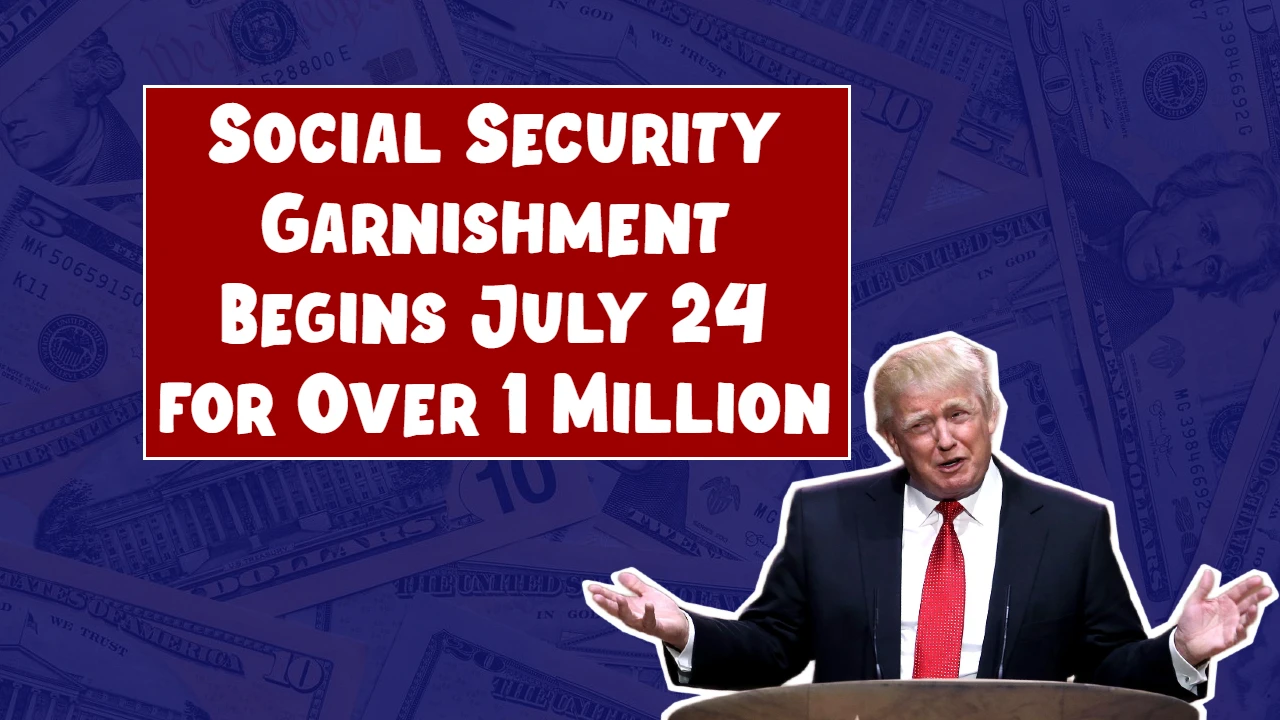As of Friday, some 1.1 million Social Security recipients in the U.S. could have part of their payments withheld every month, due to garnishment orders that go into effect on July 24. Garnishment is stressful, but there are ways to avoid it or at least limit its scope that the law allows.
You might be able to protect your benefits by moving early, negotiating a payment plan, applying for a hardship exemption, or asking for a review. Understanding your rights is a necessary step toward protecting against an unnecessary financial drain in retirement.
Social Security Garnishment 2025
On July 24, the U.S. government will start withholding Social Security payments for more than a million Americans. These levies are intended to collect delinquent federal debts. Yet many could be eligible for protections or legal recourse. Scrutinizing your financial status, reaching out to the proper agency, and looking into relief programs could help you halt or reduce garnishment.
Filing for financial hardship or renegotiating repayment terms can be helpful. By taking immediate action and consulting with either a professional or legal aid, you may avoid having automatic deductions that from decimate your retirement income.
Social Security Garnishment Begins Overview
| Article On | Social Security Garnishment Begins |
| Country | USA |
| Department | Social Security Administration (SSA) |
| Eligibility | Individuals with federal debts |
| Amount | According to the wrongdoings |
| Start Date | July 24, 2025 |
| Date to Act | Contact the authorities |
| Category | Financial Aid |
| Official Website | Ssa.gov |
Why does Social Security Garnishment occur?
- Not all people receive Social Security; not all of those who do are at risk of garnishment.
- The garnishment is primarily aimed at those with federal debts, including student loans, taxes, child support, or alimony.
- SSI (Supplemental Security Income) cannot be garnished.
- Nearly all other federal benefits are also shielded from private creditors, including SSDI and retirement benefits, Railroad and survivors’ benefits, and Veterans’ and military annuities.
- But some veterans’ benefits can be garnished to pay off government debt.
Garnishment never happens unless the recipient has been repeatedly warned of the intention to take wages, or the aid turbines have made attempts to collect on the obligation, and the aid subject has refused or failed to pay any part of the aid sought.
Perspective of Social Security Garnishment
Though garnishment is considered a bad thing from the individual perspective, historically it has been regarded as having great value from a government and societal view. The main objective is to collect delinquent federal debts owed, for example, for unpaid taxes, past-due student loans, or child support.
As an example, this includes child support garnishments that provide for children and custodial parents to receive the financial assistance they are entitled to. In the case of back taxes or student loans, garnishment is a way for the government to uphold the integrity of federal lending programs.
Types of Social Security Garnishments
| Garnishment Type | Agency |
| Student loans by the federal government | Department of Education |
| Taxes Unpaid | Internal Revenue Service |
| Alimony for a child | State Child Support |
| Debt of Credit Card | Federal Banks |
| Medical Bills | Federal Authorities |
Effects of Garnishment on the Economy
Initiation of garnishment for more than one million Social Security recipients could have ripple effects on the economy. On one hand, the recovery of federal debts gathers more money for government programs, which can be used to lower deficits or fund crucial services. The funds repatriated through these recoveries could also go to public health, roads, or schools, further stimulating the economy.
But the garnishment process can also have an economic downside for families. The elderly and disabled who are dependent on their monthly Social Security payments will have less money to spend. This could be depressing consumer spending in local economies, especially those where retirees make up a large share of the population.
What Can Be Done next?
- If you are at imminent risk of Social Security garnishment, some legal moves and strategies can be considered to reduce or stop the garnishment.
- Begin by reaching out to the agency to which you owe money, like the IRS or the Department of Education, and inquiring about payment plans or settling your debts.
- Quite often, having a formal payment agreement can prevent a garnishment and can put you in a better position to handle your debt in a real-world way.
- If losing some of your Social Security check would keep you from being able to afford necessities such as food, rent, or medical care, you may be eligible for this option.
- You will typically have to submit documentation of your income and expenses when applying for a waiver.
- You can also seek assistance from legal aid lawyers, certified credit counselors, or debt advisers to help with appeals or needed paperwork.
FAQs
Can Social Security benefits be garnished for student loan debt?
Yes, unless the recipient qualifies as facing hardship or gets the loan forgiven.
Can an SSI payment also be garnished?
No, SSI cannot be garnished.
What portion of a Social Security check can be garnished?
Up to 15 percent of monthly benefits, depending on the type of debt.
Is there a way to stop garnishment once it starts?
Yes, by pursuing a hardship claim, appeal, or alternate payment agreement.
Will garnishment affect all retirees?
Not all, only those with qualifying outstanding federal debts are impacted.



